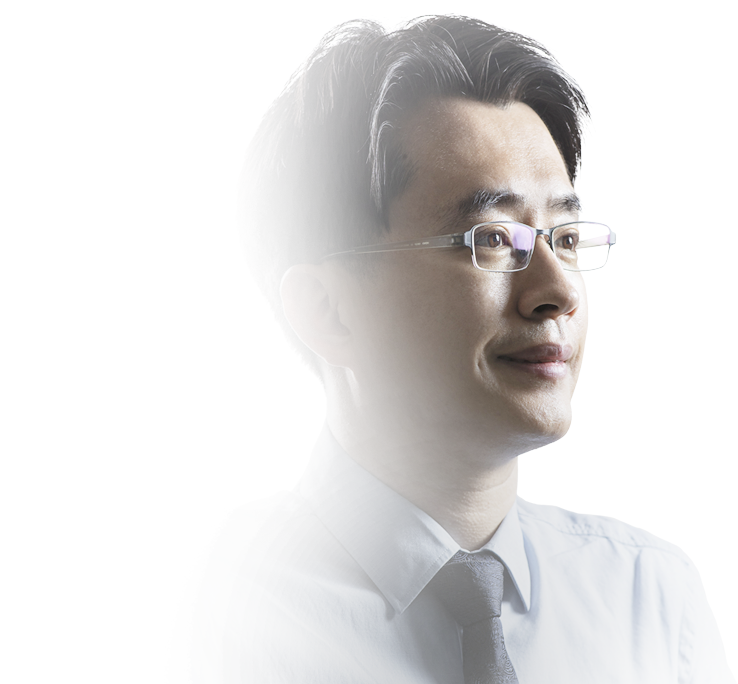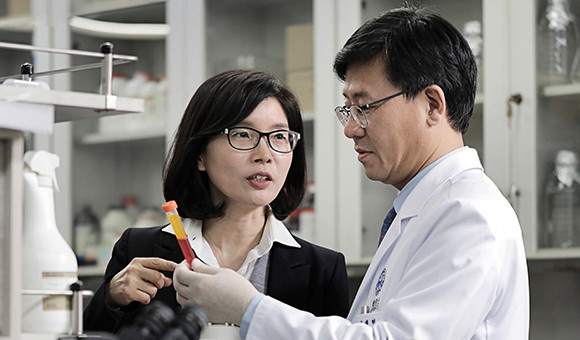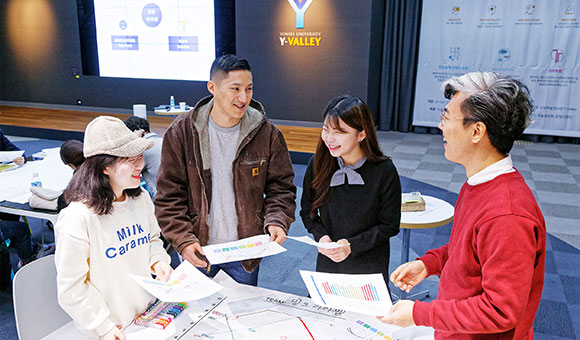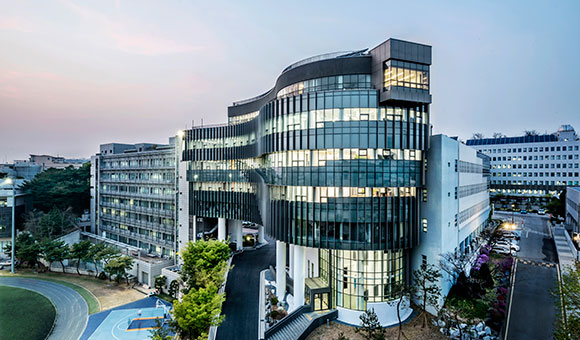

RESEARCH-ORIENTED
UNIVERSITY
Research Environment for the Future
Yonsei University provides an environment and system that helps researchers to focus solely on their research, which is key to university competitiveness. Yonsei is enhancing its status as a research oriented university by continually improving its proactive research support system and policies (including administrative support, allocation of research facilities, and joint research-matching), thereby promoting more creative research, innovative technology, and knowledge gathering.
Yonsei University received a near-perfect
score of 98.9 in the category of income from
academia-industry collaboration in the Times Higher
Education (THE) Asia University Rankings 2020.
This category assesses activities that connect
innovative research findings with industry.
Yonsei’s high score demonstrates that its research
results directly impact people’s daily lives.
Yonsei University is strengthening the
competitiveness of national industries and
universities through world-leading technological
cooperation between industry, academia,
research, and government.
Professor, School of Integrated Technology


Research Support Administrative System
Yonsei University introduced on-site research support to provide customized administrative services for researchers. The Office of Research Affairs has strengthened research data collection and analysis to support research policy establishment, to provide research performance analyses tailored to researchers, and to provide updated information on trends in major R&D projects and policy changes. The existing fund management system has been expanded and reorganized into the Research Management System II, and a paperless system has been established to simplify research administration, thus creating a research-oriented environment.
The Yonsei Center for Research Facilities (YCRF) was established in 2010 in response to the rapidly changing research environment. YCRF builds research infrastructure and strengthens research competitiveness by providing equipment training and seminars for researchers inside and outside the university. The center has a total of 60 types of advanced research equipment worth approximately 20 billion won, including top-of-the-line TEM, FIB, HR-XRD, Confocal Microscope, ICP-MS, ICP-OES, Raman, Thermal Analyzer, and BET. In addition, Yonsei University introduced the PURE program, a research information management system by Elsevier, to showcase the university’s excellent research performance to researchers and institutions around the world.
Improved Research Support for Newly-Appointed Faculty
Recruiting outstanding faculty is crucial for strengthening university research competitiveness. To build a creative research atmosphere and to encourage the spirit of challenge in our newly-appointed faculty, Yonsei University has operated the Research Initiative for the Future since 2014. Through this program, Yonsei University invests about 3 billion won annually in identifying challenging research themes and in fostering innovative research among our new researchers.
In 2020, Yonsei University launched the Special Support Program for Humanities and Social Sciences to strengthen research competitiveness in these fields. The project is aimed at expanding research funding for humanities and social sciences (including arts and sports), especially for the ‘pure’ academic discipline. In particular, the project aims to improve both the quality and quantity of research capabilities in the humanities and social science fields by expanding research outcomes not only to journal articles but also to academic books.


Support Platforms for International Collaborative Research
Yonsei Frontier Lab was opened in 2017 to help Yonsei researchers communicate seamlessly with leading researchers around the world. Yonsei University also established Open Network Lab, a joint research hub for researchers, to provide a support platform for international joint research. In addition, the International Joint Research Cooperation Project provides research funding to collaborative research teams through strategic partnerships with leading academic institutions around the world. Currently, Yonsei University runs joint research programs with four universities - University of Geneva, University of Sydney, Emory University, and Tel Aviv University – under this project and plans to include more partners in the near future.
Yonsei University also recruits and supports outstanding young scholars, domestic and international, for the globalization of Yonsei’s research and education and for stimulating research performance. Scholars with exceptional research performance in the past two years are selected and provided with grants, incentives, and administrative support for up to three years. Also, to promote joint research with top scholars in the world, Yonsei University runs the Overseas Outstanding Scholar Support Program. A total of 27 leading professors from abroad have been invited since 2017.
Furthermore, Yonsei University is working to create an optimal environment wherein our scholars can devote themselves wholly to research. As part of the initiative, the Yonsei Research Committee is placed directly under the leadership of the University President, and offers funding and space to distinguished researchers for a maximum of ten years under the name of ‘Nobel Project’.
Initiating Convergence Research
With the conviction that the future depends on convergence research, Yonsei University is planning to build an environment to freely connect various disciplines, ranging from medicine, life science, science, engineering, humanities to social sciences. At the International Campus, the university is constructing Yonsei Science Park, an industry-academia-research complex, to establish an innovative industry-academia R&D ecosystem. Yonsei University is also building towards a biomedical science complex in Sinchon Campus, for the promotion of convergence research and for synergy in education and research. By converging Yonsei University Health System (YUHS), the College of Life Science and Biotechnology, the College of Engineering, and the College of Science, Yonsei University will maximize merits of connecting them systematically as well as spatially, for active pursuit of integrated, interdisciplinary and creative ideas.
Furthermore, Yonsei University is home to the Institute for Basic Science (IBS) Center for NanoMedicine. The center aims to reach the world's top 10 by 2025 as a convergence research center in the fields of nanoscience and nanomedicine that looks forward to the next 100 years.
Yonsei University also established the Yonsei Advanced Science Institute as a support organization to conduct basic science research and education through exchanges with researchers from world-renowned universities such as MIT, Caltech, Harvard University, UCSF, UC Berkeley, and Texas A&M University.
To this end, the IBS Hall, built on the concept of a “Center Without Barriers,” features cutting-edge research equipment and facilities such as high-performance electron microscopes, MRI, cleanrooms, and animal laboratories that break the boundaries between disciplines and individual researchers. Through open research and creative communication at IBS Hall, Yonsei will lead innovation in basic science and convergence research.

